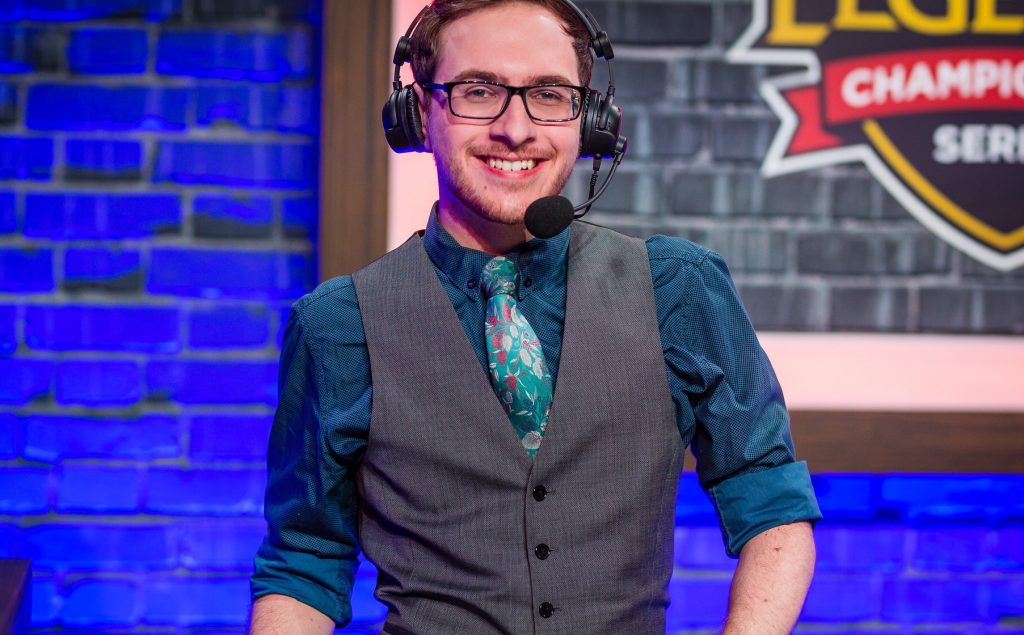
Spotlight on… James O’Leary
James “Stress” O’Leary is a Welsh Esports commentator who predominantly works on League of Legends in Europe. He currently lives in Berlin with his fiancé.
I wanted to find out more about the challenges of being an Esports commentator as well as explore how he gets on as an out gay man in a world that struggles to be inclusive.
Robin: Hi James! Let’s start out with you introducing yourself to our readers
I’m James “Stress” O’Leary, I’m an esports commentator from Cardiff, Wales. I identify as a gay male and use he/him pronouns. I’ve been working in esports for nearly 10 years, predominantly working on League of Legends, spending 3 years as a part of Riot Games’ European League of Legends Championship (EU LCS) broadcasting team. I live in Berlin with my fianceé and work for Splyce who are an esports team playing in the LEC, the premier tournament in Europe for LoL. Outside of esports, I’m a commentator and announcer for Professional Wrestling, mostly working with the German Wrestling Federation in Berlin.
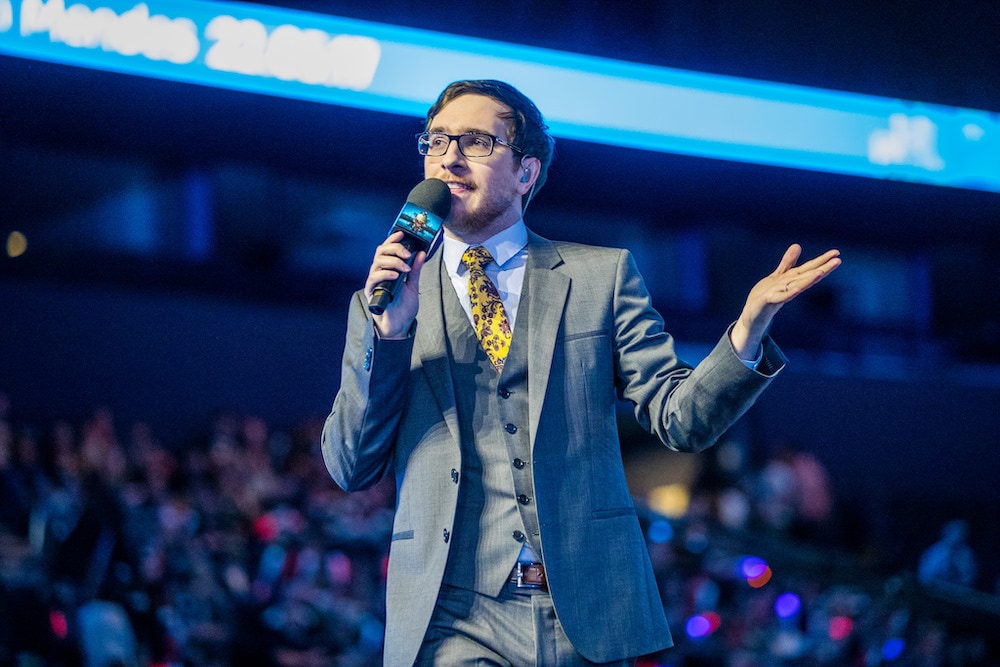
What got you into being an Esports commentator?
I actually got into esports commentary accidentally. I was attending an event in the UK as a journalist, covering some of the competitions as a hobby. The League of Legends tournament finals had no commentary team lined up, and Michael “ODEE” O’Dell, who at that time owned ‘Team Dignitas’, a UK esports team, suggested that I volunteer to commentate. I have a background in radio, broadcast, and theatre, so it felt like a natural step forward for me. I knew the game well, but looking back, I was really rough around the edges. From that moment on though, I was sure that I wanted to be a caster, as it’s one of the best feelings out there.
I worked for two to three years doing small events, before finally moving to Berlin, initially as an in-game observer. Think of it as a virtual camera operator, showing all of the action in the game. I was very fortunate that Riot needed additional casters about 6 months after moving to Germany, so I interviewed for the role and got it.
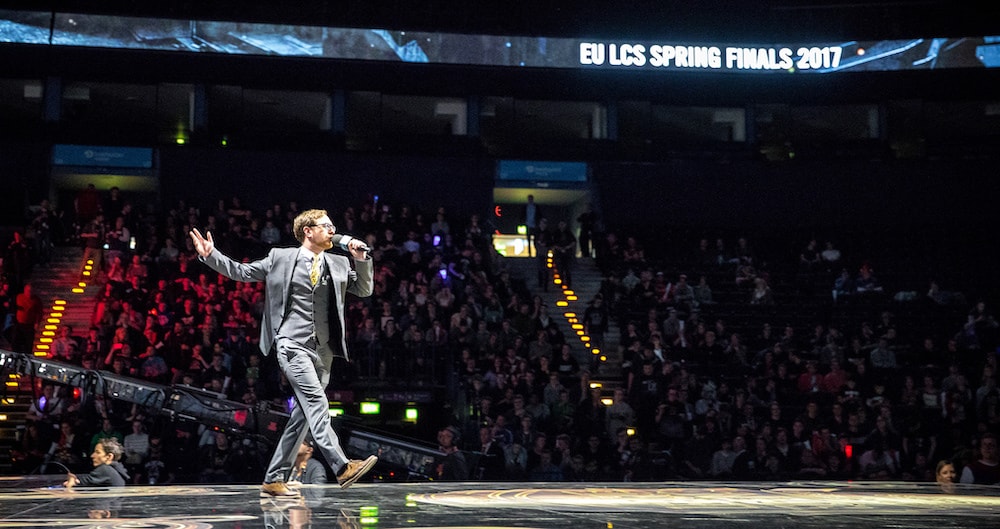
What was your career before becoming a commentator?
Before becoming a commentator, I worked as a Materials Engineer, which was my field of study during my time at University. I developed and tested cutting edge insulation materials for deep sea oil pipes, which sounds a lot cooler than it was. Ultimately, I’m glad not to be working in an industry that has such an adverse effect on the environment any more.
What’s the hardest thing about being a commentator?
It’s almost certainly that every broadcast as an analyst or colour commentator is essentially an exam that it’s impossible to be 100% prepared for.
In the League of Legends esports scene, there are professional games being played almost every day of the week at all different times of day. Between North America, Europe, China and South Korea, there’s at least forty hours of broadcast each week, and that doesn’t include many of the emerging regions around the world, which totals 13 different broadcasts.
What that means is there’s always something new to learn, and always something that you’ve probably missed, and everything you say on broadcast can and will be brought up if you aren’t on the money.
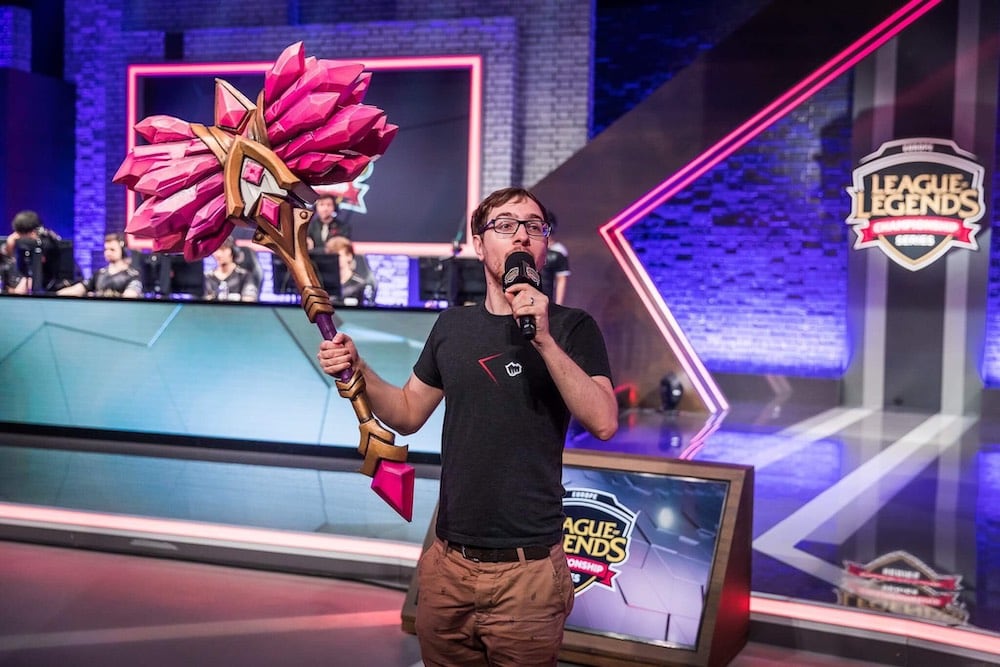
What’s been one of the funniest moments you’ve had being a commentator?
One of the funniest moments I’ve had in commentary comes from a wrestling broadcast. In the GWF we have a Championship aimed mostly at entertainment, where it’s to crown the “Worst Wrestler in GWF”. At an event called Legacy last year, there was a match between two underdog wrestlers, which ended up with a 2 foot high step ladder being involved. It was a really exaggerated and funny match because it played on some of the ridiculousness you see in wrestling.
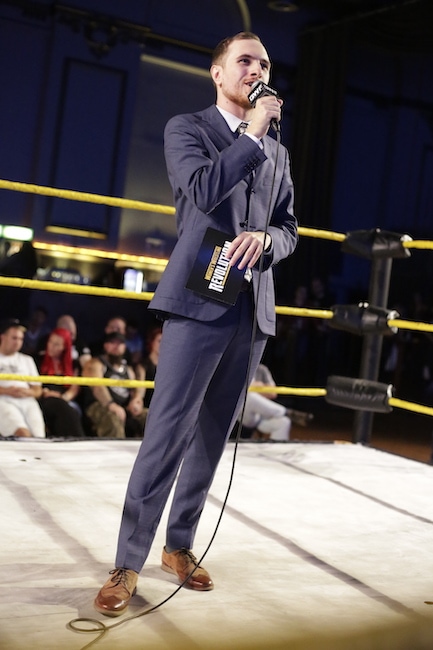
Why do you think Esports’ popularity has exploded these past few years?
Esports gives a whole group of young people who feel like traditional sports don’t speak to them, an outlet to show fandom through competition. Between that and the overall growth of the gaming sector, it’s a natural progression for people to want to watch competitive play, and the additional exposure esports has got over the last few years has allowed the scene to grow exponentially.
Esports has a poor reputation for diversity, why do you think this is?
The games industry traditionally hasn’t fostered diversity and inclusion. For almost all gamers, I don’t believe that’s a malicious choice, rather that generally, games were advertised towards what society used to portray as “normal” boys. I hate using the word normal to describe a person, because to me, there is no distinction that any one subsection of people are normal, but most characters in games throughout the last 30 years have been created by, and meant to be relatable to men and boys that are attracted to women.
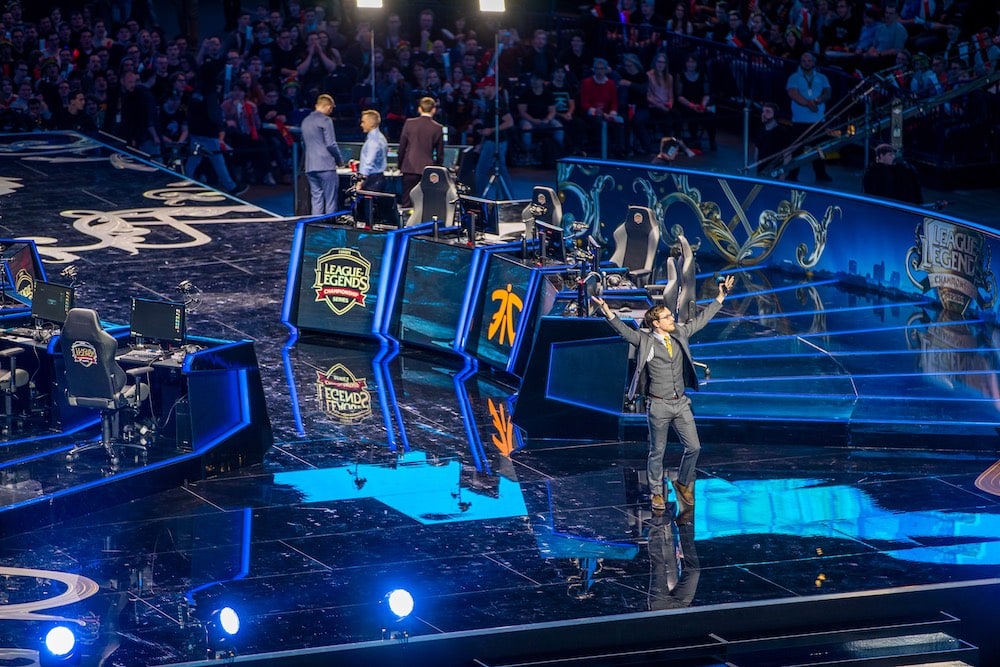
What more can be done to encourage diversity in Esports?
It’s going to be a slow burn, just like the fight for equality day to day around us, but the only way we are going to speed things up are to stand up and make sure we’re heard. In my mind, companies and public figures should be promoting diversity and equality, and that also means we should be supporting the ones that are out there pushing our message genuinely.
Have you always been openly gay in the Esports world?
No I haven’t, and it’s my one big regret from my time on the EU LCS. I came out initially to friends and some family before I ever really got into esports. Ironically, it was not long after I came out that I stumbled upon esports, and it helped to distract myself from a break up. Until I moved to Berlin, I never really hid the fact that I was gay, but it had no reason to come up on broadcast, and I was so rarely round other esports people in person that conversation was very surface level.
Moving to Germany, I initially kept my personal life private. It took until a year after moving to Berlin for me to tell any of my colleagues, and another 6 or so months to make it public in any way. Even after a very quiet coming out, I never pushed the fact I’m gay on broadcast, and it pains me every time I think about it.
I really wish I’d had the courage to stand up and fight for our community to be more inclusive. I know that at any time, countless number of LGBTQ+ identifying viewers were watching, and by hiding myself, I wasn’t out there telling each and every one of them that they are welcome.
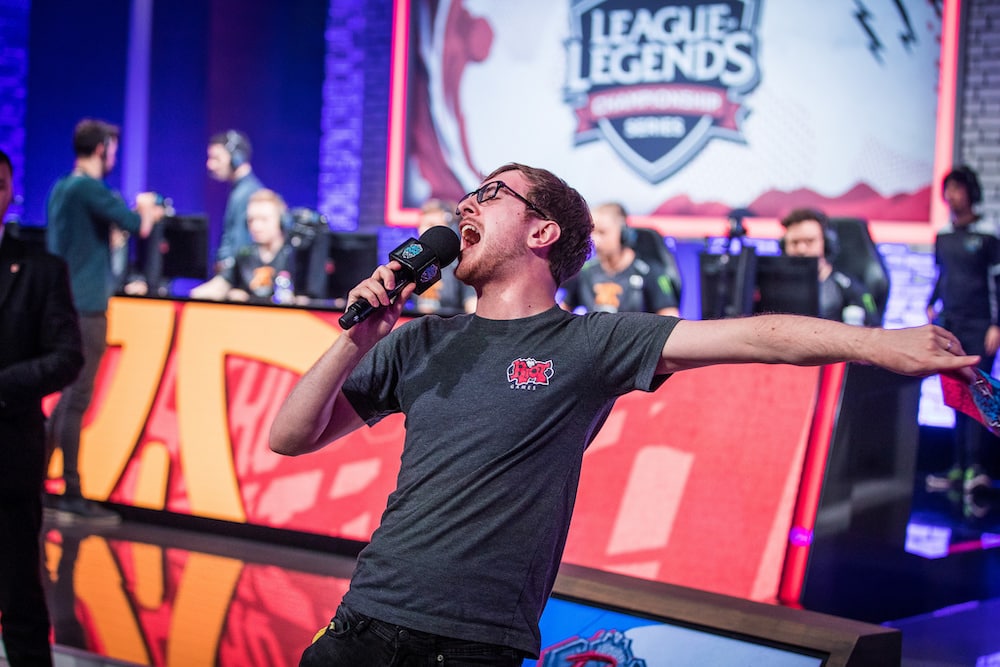
How have you found being gay in the Esports and video games industry?
Being gay in esports generally doesn’t affect much, but every so often you get a stark reminder that the world isn’t fully at the point of equality, and I’m aware that I’m saying this as a cis-gendered white male, that has many priviledges others don’t. We posted a message of support for the LGBTQ+ community during pride month on the Splyce social media, and a handful of the replies were abhorrent. I’ve not had much directed at me personally, but it’s always on my mind whenever I talk about my personal life.
What would be your advice for a young LGBTQ person starting out or looking to get into pro Esports?
My biggest piece of advice would be to be yourself to whatever degree you’re comfortable with. It’s not easy to be openly LGBTQ+ anywhere in life, and no one should hold it against you if you’re not ready to show the world who you are. That being said, try to be surrounded by people who you can be true to yourself around, you’ll be a lot happier for it!
What was your earliest memory of video games as a child?
My very earliest memory is playing Duck Hunt and Mario Bros on the NES with my brother. The first game I really played was Pokemon Blue, and I’ve been a Pokemon fan ever since.
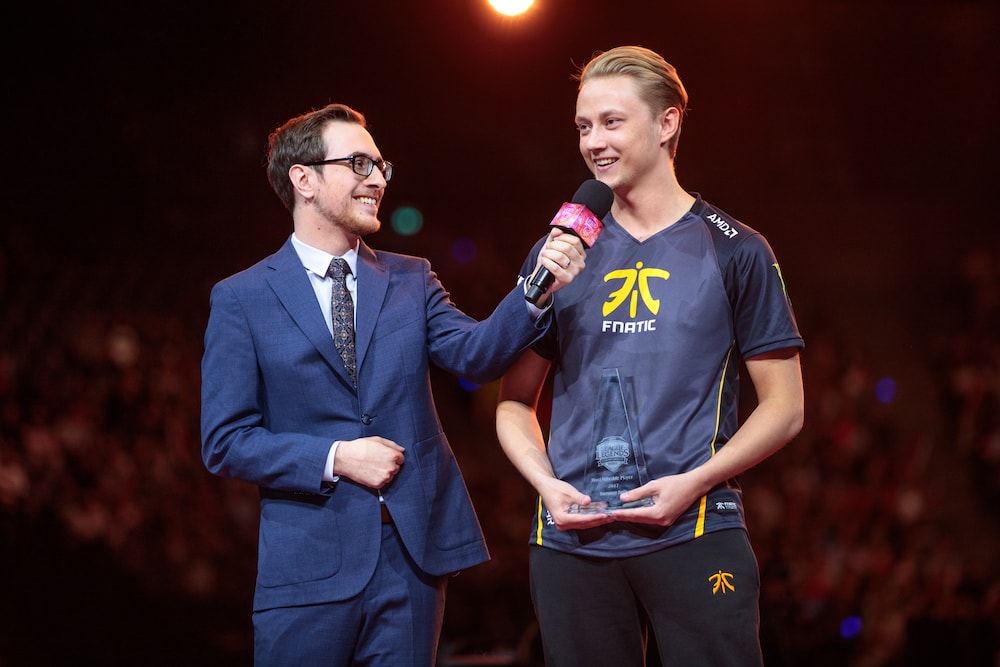
What was the one game that defined your childhood?
I played a lot of Xbox 360 games during my teenage years, Halo 3 and Battlefield: Bad Company 2 were the two I put the most time into. Before that was a mix of Pokemon games and other Gameboy titles, and being a wrestling fan, I spent hundreds of hours playing WWE games on the PS1, PS2 and Gamecube.
What games do you enjoy playing now?
At the moment I’m playing a lot of Magic the Gathering: Arena, as well as League of Legends, especially since the release of Team Fight Tactics, Fortnite and occasionally Overwatch. From time to time I’ll play something like Wolfenstein for the single player campaign as it’s a lot less exhausting than pure multiplayer, competitive games. When I’m travelling I play a lot of PokemonGO and various Switch games.
What does the future hold for James?
We’ve got a lot of cool stuff in store for Splyce for the rest of the 2019 LEC season, and with the League of Legends World Championships being in Europe this year, I’ll be doing my best to make those events as good as possible from our brand’s perspective. Meanwhile I’ll be working with GWF throughout the year, while appearing on multiple podcasts for both wrestling and esports.
How can our readers see you in action?
You can catch me on ‘The Snake Pit’ podcast, and our behind the scenes of the LEC series ‘Splyce of Life’ on the Splyce YouTube channel, as well as on GWF shows available on www.wearegwf.com and youtube.com/wrestlingGWF.
If you’d like to follow me, you can find me @stresscasts on Twitter and Instagram!






Comments are closed.